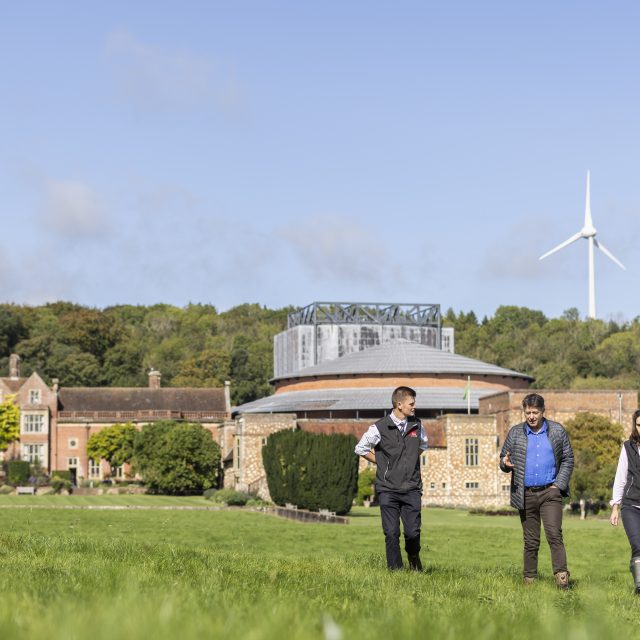Key outcomes from the 2024 Food and Farming Summit
Food security in the UK is ‘broadly stable’ but there is a need to boost UK production of fruit and vegetables, according to the UK’s first Food Security Index.
The index also highlights that there is a ‘longer-term risk from climate change’ and the exceptionally wet winter and spring of 2024 poses significant challenges to some domestic production.
The index was published to coincide with the second Food and Farming Summit, hosted by Prime Minister Rishi Sunak at Downing Street.
Key conclusions of the Index report include:
- The UK produced most of the cereals, meat, dairy, and eggs that it consumed in 2022 (2023 figures will not be published until June 2024). However, it was less self-sufficient for vegetables (55%) and fruit (17%) due to climate, seasonality and consumer and producer choices.
- The overall production to supply ratio, generally understood as a broad measure of national self-sufficiency, has not changed significantly since the 2000s. Cereals production is susceptible to year on year change due to extreme weather events. For example, in 2020 there was a 26% drop in production due to extreme bad weather, while 2022 saw an 8.5% increase. Reductions in the 2024 harvest are anticipated, particularly for wheat, due to recent wet weather and flooding.
- Ten countries provided 69% of all UK food imports in 2023. The UK is reliant on specific countries for some key products such as Spain for citrus fruit, the Netherlands for tomatoes and India and Pakistan for rice.
- In 2023, 69.7% of the UK’s land (17 million hectares) was used for agricultural production, a 2.3% decrease in UAA from 2022. Year-on-year land use change is typically in the range of 0.0% to 5.0%, so the scale of change seen in recent years is broadly within or close to what would be considered normal.
- The total area of cereal crops in the UK decreased by 2.7% between 2022 and 2023 to almost 3.1 million hectares. Horticultural crops land use decreased by 5.2% 2022 and accounted for 145,000 hectares of UAA in 2023.
- Total factor productivity (TFP) is the ratio of inputs to outputs and is used as a measure of efficiency of production. TFP has grown at an annual average rate of 1.1% since the 1970s allowing the UK to produce the same amount of food with less inputs and over a reduced area of land. In 2022, TFP reached a high of 167.3 which means that the UK farming sector was at its most productive since records began.
Concern over the UK’s reliance on imported fruit and vegetables has prompted the government to roll out a new ‘blueprint’ to boost domestic production. It is not before time that the government has realised the fresh fruit and veg sectors are in need of special attention. Of the many challenges they face, the changing balance of risk and reward needs particular focus and it is hoped the actions the government is proposing will lead to an overall improvement to provide producers and investors with greater confidence. However, although the blueprint has said that current domestic production needs improving, it has not indicated by how much.
Highlights of the blueprint include:
- Making £75 million available to support internal drainage boards (IDB), to accelerate recovery from the winter 2023 to 2024 storms and upgrade assets.
- Rolling out a new £80m Horticulture Resilience and Growth offer to support growth, innovation, and environmental outcomes.
- A pledge to assess and consider the sector’s access to affordable and increasingly sustainable energy, with a secure supply of water.
- Provide funding to encourage adoption of bespoke packhouse automation to reduce the sector’s reliance on low-skilled migrant labour.
- Extending the Seasonal Worker visa route for another five years from 2025 to 2029. The number of visas available to the horticulture sector in 2025 will be set at 43,000.
- A promise to shape the Sustainable Farming Incentive (SFI) and other grants in Defra’s programme to better meet the specific needs of the sector.
- Review any outstanding planning barriers for the horticulture sector.
- Consult on a Permitted Development Right for small scale, single on-farm wind turbines to help meet growers’ energy needs.
- Explore how to better support long-term cold storage of crops so that more UK grown produce can be consumed out of season.
Other announcements made at the summit were £3 million towards supporting small and mobile abattoirs and confirmation that a Tenant Farming Commissioner for England will be appointed in the autumn.
The government is also making £72 million available for the Endemics Disease Scheme, which will help to eradicate a range of health conditions across cattle, pigs and sheep.






